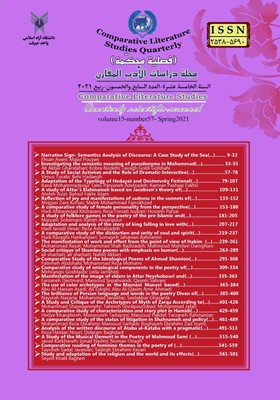The use of color archetypes in the Masnavi Manavi based on Jung's theory
Subject Areas : شعرAbu Al-Hassan Asadi 1 , Ali Eshghi 2 , Abu Al-Qasim Amir Ahmadi 3
1 - PhD Student in Persian Language and Literature, Sabzevar Branch, Islamic Azad University, Sabzevar, Iran
2 - Assistant Professor, Department of Persian Language and Literature, Sabzevar Branch, Islamic Azad University, Sabzevar, Iran
3 - Assistant Professor, Department of Persian Language and Literature, Sabzevar Branch, Islamic Azad University, Sabzevar, Iran
Keywords: مثنوی, مولوی, رنگ, یونگ, کهنالگو, Archetype, Color, Jung, Masnavi, Movlavi,
Abstract :
One of the new types of literary criticism is the archetypal critique of texts, which is based on psychological critique and it is based on the theories of the famous and contemporary Swiss psychologist Carl Gustav Jung. Jung calls the collective unconscious products, prototypes, archetypes that have various manifestations such as mother, wise old man, hero, anima, animus, rebirth, shadow and fraud. According to Jung, images have no content alone, so they manifest themselves in the form of symbols in dreams and myths. Today, archeology is one of the main topics of literary criticism, especially mythological criticism, and the search for archetypal symbols is one of the favorite topics of mystical literature researchers. Since Movlana is a mystic who has a symbolic mind and has composed "Masnavi" in the form of a cryptic work that has an infinite range of archetypal symbols and has the ability to study archetypal, so in this study, the archetypal symbols of Movlavi's "Masnavi Manavi" in the class of archetype was examined in the sub-category of color.
کتابنامه
بیلسکر، ریچارد. 1384ش، یونگ، ترجمه حسین پاینده، تهران: انتشارات طرح نو.
سید حسینی، رضا. 1376ش، مکتبهای ادبی جهان، جلد اول، تهران: انتشارات نگاه.
شایگان، داریوش. 1381ش، بتهای ذهنی و خاطره ازلی، چاپ پنجم، تهران: انتشارات امیرکبیر.
شمیسا، سیروس. 1376ش، داستان یک روح، چاپ سوم، تهران: انتشارات جامی.
شولتز، دوان پی و دیگران. 1387ش، تاریخ روانشناسی نوین، ترجمه علی اکبر سیف، چاپ ششم، تهران: انتشارات دوران.
گورین، اِ و دیگران. 1371ش، راهنمای رویکردهای نقد ادبی، ترجمه زهرا میهن خواه، چاپ اول، تهران: انتشارات اطلاعات.
محمدی آسیابادی، علی. 1387ش، هرمنوتیک و نمادپردازی در غزلیات شمس، تهران: انتشارات سخن.
یونگ، کارل گوستاو. 1371ش، خاطرات، رؤیاها، اندیشهها، ترجمه پروین فرامرزی، چاپ دوم، مشهد: انتشارات آستان قدس رضوی.
یونگ، کارل گوستاو. 1373ش، روانشناسی و کیمیاگری، ترجمه پروین فرامرزی، چاپ اول، مشهد: انتشارات آستان قدس رضوی.
یونگ، کارل گوستاو. 1376ش، چهار صورت مثالی، ترجمه پروین فرامرزی، چاپ دوم، مشهد: انتشارات آستان قدس رضوی.
یونگ، کارل گوستاو. 1381ش، یوگا، ترجمه جلال ستاری، چاپ دوم، تهران: نشر میترا.
یونگ، کارل گوستاو. 1383ش، انسان و اسطورههایش، ترجمه حسن اکبریان طبری، چاپ اول، تهران: نشر دایره.
یونگ، کارل گوستاو. 1383ش، انسان و سمبولهایش، ترجمه محمود سلطانیه، چاپ چهارم، تهران: انتشارات جامی.
یونگ، کارل گوستاو. 1383ش، روانشناسی و شرق، ترجمه لطیف صدقیانی، چاپ اول، تهران: انتشارات جامی.
یونگ، کارل گوستاو. 1383ش، ضمیر پنهان، برگردان ابوالقاسم اسماعیل پور، چاپ دوم، تهران: انتشارات کاروان.
یونگ، کارل گوستاو. 1386ش، اسطورهای نو نشانههایی در آسمان، ترجمه جلال ستاری، چاپ اول، تهران: نشر مرکز.
مقالات
محمودی، محمدعلی و علی اصغر ریحانی فرد. 1391ش، «تحلیل کهن الگویی حکایت پادشاه و کنیزک مثنوی بر اساس دیدگاه یونگ»، شماره 18، پژوهشنامه ادب غنایی، صص145-166.
_||_Bibliography
Billsker, Richard. 2005, Jung, translated by Hossein Payendeh, Tehran: Publications of Tarhe No. Seyed Hosseini, Reza 1997, World Literary Schools, Volume One, Tehran: Negah Publications. Shaygan, Dariush. 2002, Mental Idols and Eternal Memory, Fifth Edition, Tehran: Amirkabir Publications.
Shamisa, Sirus. 1997, The Story of a Soul, Third Edition, Tehran: Jami Publications.
Schultz, Duane Pee and others. 2008, History of Modern Psychology, translated by Ali Akbar Seif, sixth edition, Tehran: Doran Publications.
Gorin, A. et al. 1992, Guide to Literary Criticism Approaches, translated by Zahra Mihankhah, first edition, Tehran: Information Publications.
Mohammadi Asiabadi, Ali 2008, Hermeneutics and Symbolism in Shams Ghazals, Tehran: Sokhan Publications.
Jung, Carl Gustav. 1992, Memoirs, Dreams, Thoughts, translated by Parvin Faramarzi, second edition, Mashhad: Astan Quds Razavi Publications.
Jung, Carl Gustav. 1994, Psychology and Alchemy, translated by Parvin Faramarzi, first edition, Mashhad: Astan Quds Razavi Publications.
Jung, Carl Gustav. 1997, four examples, translated by Parvin Faramarzi, second edition, Mashhad: Astan Quds Razavi Publications.
Jung, Carl Gustav. 2002, Yoga, translated by Jalal Sattari, second edition, Tehran: Mitra Publishing. Jung, Carl Gustav. 2004, Man and His Myths, translated by Hassan Akbarian Tabari, first edition, Tehran: Daireh Publishing.
Jung, Carl Gustav. 2004, Man and His Symbols, translated by Mahmoud Soltanieh, fourth edition, Tehran: Jami Publications.
Jung, Carl Gustav. 2004, Psychology and the East, translated by Latif Sedghiani, first edition, Tehran: Jami Publications.
Jung, Carl Gustav. 2004, Hidden Conscience, translated by Abolghasem Esmailpour, second edition, Tehran: Karvan Publications.
Jung, Carl Gustav. 2007, New Myths of Signs in the Sky, translated by Jalal Sattari, first edition, Tehran: Markaz Publishing.
Articles
Mahmoudi, Mohammad Ali and Ali Asghar Reyhanifard. 2012, "Archetypal Analysis of the Story of the King and Maid of Masnavi Based on Jung's View", No. 18, Journal of Lyrical Literature, pp. 145-166.


